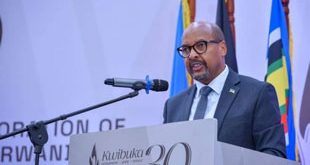
Kampala, Uganda | THE INDEPENDENT | Ugandan women have been advised to look at the so-called ‘kameeza’ money as a source of investible capital. Kameeza is a cash daily subsistence allowance that typical Ugandan husbands leave their women in the morning before they go to work. Some smart women have become rich by saving small bits of kameeza money and investing it quietly.
The advice is coming following the release of a report that shows that enterprises run by women in Uganda were more hit by the Covid-19 pandemic and its effects, than the businesses run by their male counterparts, according to studies.
This was mainly due to the socio-economic effects of the pandemic on the community and the economy as a whole, with men affected differently from women.
The businesses and incomes of women were thus more likely to be hit because they were more vulnerable to spending on home needs than the incomes for men, especially in micro and small enterprise households.
Women have testified that their husbands abandoned them during the lockdown and had to take on the responsibility of feeding the rest of the family.
According to a study by Microsave Consulting Ltd, a global financial research firm, the average monthly incomes for MSEs which stood at 900,000 shillings for both men and women at the beginning of the pandemic, fluctuated differently over the two years.
In the first lockdown in 2020, the incomes generally declined to 450,000 and remained stable for men through the second lockdown.
However for women, there was a further decline in the second lockdown to an average of 300,000 shillings.
Following the easing of the restrictions in the economy, according to the study, female-owned micro and small businesses earn 450,000 shillings compared to the male-owned ones at 600,000 monthly.
Dan Kasirye, the resident representative of the International Finance Corporation of the World Bank says women entrepreneurs need special support because there are several special challenges especially related to culture, that limit them.
“Studies have revealed that access to finance barriers, cultural norms, and other unfavourable regulations significantly limit the success of women-run enterprises. IFC is pleased to collaborate with Stanbic Bank, a market leader in Uganda, to champion this important initiative which we believe will contribute towards finding solutions to many of these bottlenecks,” said Kasirye.
He said that is why the World Bank’s investment arm decided to invest in women entrepreneurs partnering with local financial institutions.
IFC and the Stanbic Bank have launched an initiative to offer financial and non-financial services for women in business aimed at empowering them with competitive abilities to succeed in a world of business dominated by men.
The “Stanbic For Her” initiative offers education, information, networking, and market linkages to support women in business and will be implemented in collaboration with IFC.
It will specifically give financial literacy trainings, cash flow and management of working capital, loan management, managing savings and debt, mentorship, and advisory services.
Agnes Asiimwe Konde, the Vice President for Program Development at Alliance for a Green Revolution in Africa, says Ugandans, and women in particular need to understand the local market because it is still highly underserved.
She says the local market can ably support local entrepreneurs, with locally made products.
Under the Stanbic For Her initiative, women in business will be borrowing loans at 12.5% through their SACCOs and at 15.5% interest on direct business loans while being exempted from any charges in the event of early settlement.
This compared favorably to the open market interest rates of about 19 percent at commercial banks and 36 percent at microfinance institutions.
But Konde urges women to take financial literacy seriously, learn to save and invest the little they can get, even before going for loans.
Konde, who is also a board member at Stanbic Holdings tipped the women to grow themselves from the money that their husbands leave for them if they get a vision for the money, commonly known as ez’akameeza.
Through the Stanbic For Her programme, women will also be equipped with knowledge on investment and wealth creation with support from the SBG Securities.
“As our country’s economy rebuilds from the last two years bedeviled by the pandemic, we want to empower women and women-led enterprises to lead the recovery process,” said Anne Juuko, the Chief Executive Stanbic Bank. “We know the challenges the women-led enterprises face every day, in their quest to achieve success; Stanbic For Here is aimed at removing the barriers that are limiting the potential of Ugandan women-led businesses to thrive.”
*****
URN
 The Independent Uganda: You get the Truth we Pay the Price
The Independent Uganda: You get the Truth we Pay the Price


